Buying and Selling a Travel Trailer and a Truck
After 17 months of full-time RVing, we returned to a stationary lifestyle.
Here are the details and the financial reality of buying and selling a travel trailer and a truck. I also share my recommendations based on our personal RV living experience.
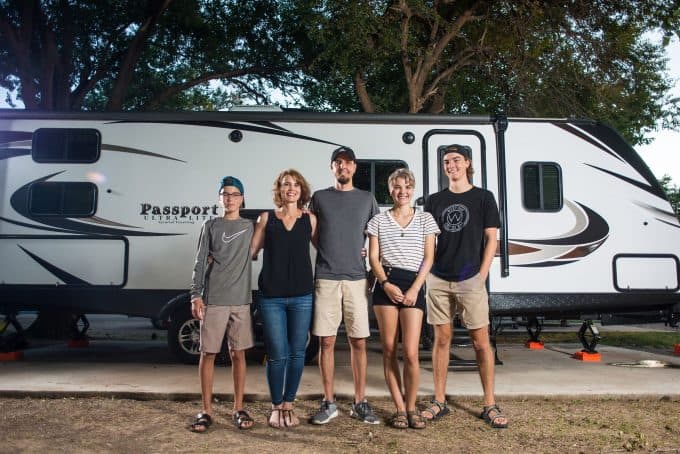
I can’t imagine what I would be feeling today if our family had not made the life-altering decision to travel the continent in a brand new travel trailer.
We fully embraced the full-time RV lifestyle. I believe we would have missed out on so much had we not followed through with that decision.
That said, the experience challenged me to my core. And all the financial uncertainties were at the heart of those challenges.
My guess is you may be facing similar uncertainties. There are a few common questions posed by most potential new RV owners.
Fear not, I will provide you with some insights to help you think it all through.
In this article, we take a deep dive into the financial realities of buying and selling our travel trailer and tow vehicle. Keep in mind this is based on our own personal experience.
Your situation will differ in some (or all) ways, depending on countless factors. That said, I hope the real experiences I share will help you move forward with more knowledge and a bit more confidence.
Financial Uncertainties of a New Adventure
For practical numbers folks like me, this is no joke. Trying to plan for the RV life feels kind of like trying to solve a mathematical equation filled with undefined variables.
Of course I cannot fill in the blanks to all the financial questions and equations related to your RV plans. I can’t see your future any better than you can.
But, I can provide a glimpse into the reality of our situation. I will show you the financial figures that stared us square in the face while entering and exiting the RV lifestyle.
I’m going to stay focused on just the travel trailer and truck costs, for the most part. Trying to tackle the entire RV living expenses ball of wax is just a bit too messy to manage, and truthfully would require its own post.
Your RV and (possibly) tow vehicle expenses will likely be your largest one-time expenses related to this decision. So let’s go deep in that arena and I will give you all of the detail I can to help you effectively plan for your adventure.
All the Lessons of Buying an RV
The First Phase of Buying an RV
We Chose Speed Over Savings
Spontaneity isn’t cheap. This is especially true when it comes to choosing the full-time RV life. Our choice to make all of this happen in 100 days cost us more money. That was true both when we bought our travel trailer and when we sold our RV.
Speed was our top priority for reasons that were specific to our life situation at the time. There is a great argument to be made for “slow and steady.” If you have the option to take your time with your decision-making, I recommend that you do so.
Even though we opted to find, buy, and move into an RV as quickly as possible, that path is not for everyone. Please choose what is best for you. Also, please don’t judge our path too harshly. It was a beautiful path, despite its imperfections.
Travel Trailer vs Other Types of RVs
You may be wondering why we chose a travel trailer over another type of RV.
It’s generally not the first choice for full-time RVers. That’s particularly true for families of five with full-grown children! Our kids were aged 19, 17, and 13 when we launched our road trip adventures.
Here’s the truth: In the midst of a lot of decisions that might not have made sense from a purely financial standpoint, the travel trailer made the most financial sense for us.
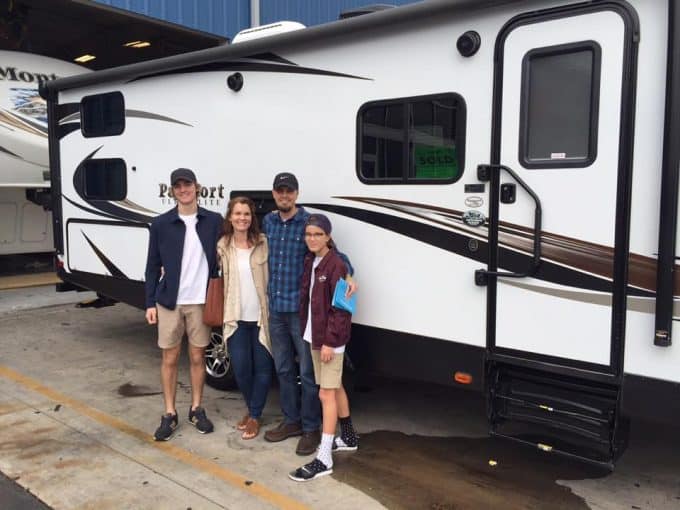
Financing an RV Is Not Easy and Not Cheap
All Recreational Vehicles are a Luxury
If you haven’t yet started to look for RV financing options, there’s an important point you should know.
It doesn’t make any difference how you plan to use it (e.g., as a full-time home). When financing a recreational vehicle, the bank will evaluate the property as a luxury purchase.
Financing an RV is Different
The gist of this is that financing a travel trailer, fifth wheel, or motorhome of any type is more challenging than obtaining a loan for a car.
Don’t expect to see many similarities between the two processes. With an RV, you will deal with strict criteria, higher interest rates, and larger down payments.
It’s not uncommon for folks to make an automobile purchase with very little, or no, money down. That does not happen on the RV side of the fence.
The process to finance an RV is not the same as financing an auto. Prepare yourself for higher interest rates, strict eligibility requirements, and a large down payment.
Higher Down Payment Required
No, it’s far more common for RV purchases to require 20%-35% as a down payment. Go in with your eyes wide open and be prepared to pony up some cash. The higher your credit score, the less money you may be required to put down.
The realities of financing a luxury item led us to one inevitable conclusion: Purchasing a reasonably priced travel trailer and a used tow vehicle, was our only reasonable path to live out our RV life dream.
New versus Used
Coming at the prospect of buying a travel trailer as a complete RV newbie, I couldn’t quite handle the thought of potentially “buying someone else’s problems.”
It’s always a big and important question at this stage: “Is it better to buy new or renovate a used RV?”
With the safety and welfare of my family on the line, I had to accept the fact that I didn’t know what I didn’t know. In other words, I was terrified at the thought of purchasing a used travel trailer, uncertain of what lurked beneath the surface.
The decision is personal. Be prepared to choose between the lower price of a used RV with the higher dependability of a new rig.
Buying New Gave Me Peace of Mind
I decided early on in the process that I was willing to buy new and deal with the potential financial consequences of rapid depreciation. For me, this was simply the price I had to pay for some peace of mind during an unfamiliar and overwhelming experience.
Purely from a financial standpoint, purchasing a gently used and professionally inspected RV can make sense. Ultimately, of course, that decision depends on many different factors in your personal situation.
I can say with confidence that you should not initially rule out the possibility of buying used, especially if you have the time and energy to find the right one.
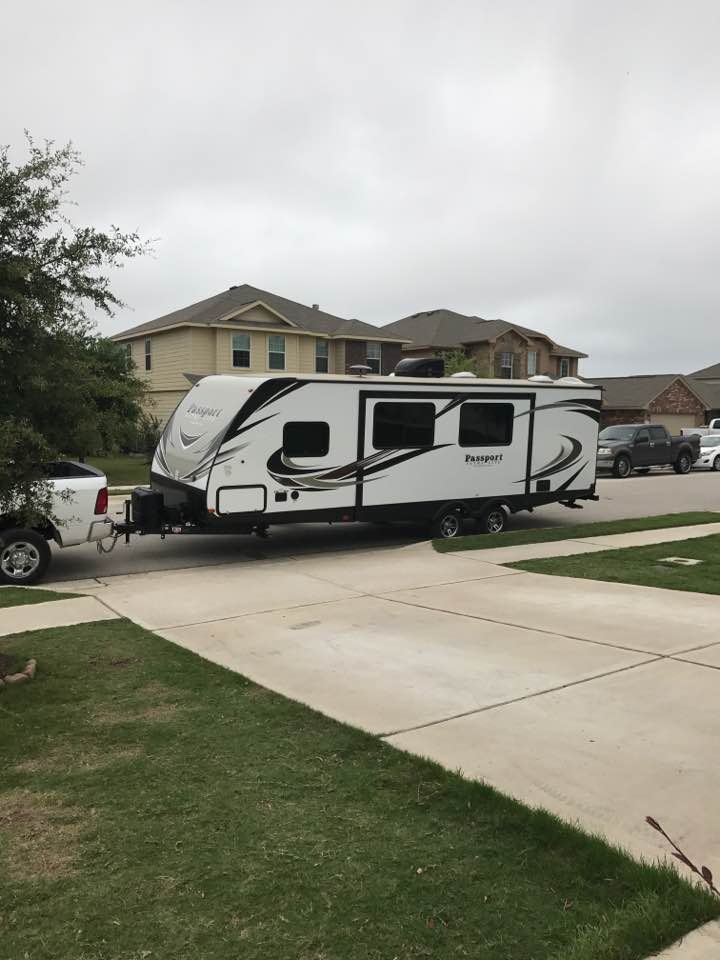
We Bought a Travel Trailer: Here are the Details
Our Four Main Considerations
We stacked up all the factors, pros and cons, and concerns. Our big adventure on the road hinged on four key factors:
Before we even began to prepare our house for sale or shop for a truck, we had to make this travel trailer purchase. It felt like an insane idea. I was a bit terrified.
I was buying an RV without any guarantee that my home would sell. Renting the house was not an option for us. We had to sell the house to make the rest of our dream a reality.
Yes, I encountered many sleepless nights around this time.
We Bought a New Keystone Passport 2670BH
Despite all the uncertainty, we marched on.
Within a few weeks, we were the proud owners of a brand new 2017 Keystone Passport 2670BH.
Remember, I mentioned above that we had to buy the RV first. We didn’t have the tow vehicle yet, so we didn’t have a way to bring our new (mobile) home, um, home.
Thankfully, a friend of ours came and towed our travel trailer to a nearby RV storage lot. The rig remained in the lot for a couple of months as we pieced together the rest of the puzzle.
Purchase Price and Monthly Payments for Our RV
Here are the details of the travel trailer purchase:
- Sale price: $23,995
- Total purchase price, including taxes and fees: $25,753
- Down payment: $6,000 (25% of sale price)
- Financed amount: $19,753
- Additional 5-Yr Protection Plan added to financed amount: $2,100
- Monthly payment: $330
- Travel trailer name: Haully
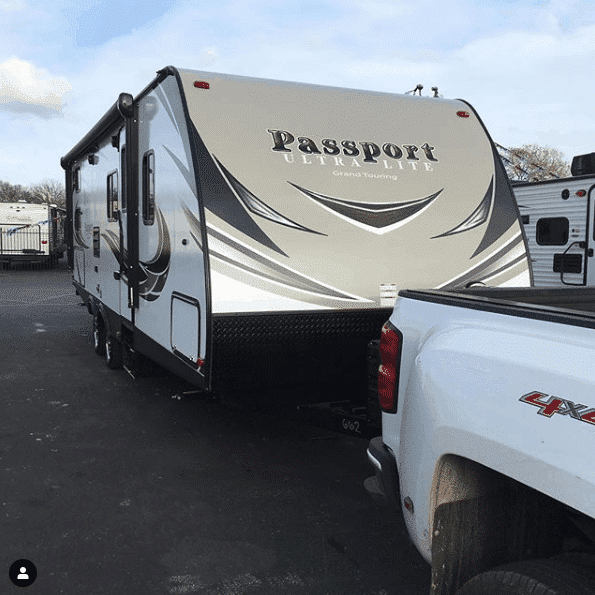
Buying the Truck (Tow Vehicle)
You might think that the travel trailer buying process would be the longest and most challenging. You’d be wrong. I guess I like to defy convention.
Selling the House and Buying a Truck
We prepared the house for sale and waited until after it sold before buying the truck. It was a whirlwind and it all happened remarkably fast. Here is a break down of the dates:
- Feb 13 – Visit RV dealership for the first time
- Mar 7 – Purchase travel trailer and park at RV storage lot
- Mar 31 – List house for sale
- Apr 6 – Accept a full-price offer
- May 8 – Close on house sale
- May 8 – BUY TRUCK SO I CAN ACTUALLY TOW MY TRAVEL TRAILER
I had about two months to research and dig into the details of finding a tow vehicle. There was no rush because I planned to use proceeds from the house sale to purchase a truck.
And I wanted to ensure that whichever truck we bought, it would be the right tow vehicle for our new home on wheels.
Minimum Towing Capacity
One of the main selling points for me on the Passport 2670BH was its lightweight, aluminum frame construction. Its empty weight was just a hair under 5,000 lbs with cargo capacity of about 1,500 lbs.
I needed to find a tow vehicle fully capable of towing 6,500 lbs with a margin of safety.
Arguments for a Diesel Truck
Even though I did toy around with the idea of buying a diesel truck, I eventually decided that was overkill for this travel trailer and for our situation.
Yes, there were still plenty of arguments out there in the RV forums for buying a diesel from the very beginning regardless of your trailer weight. The basic argument went something like this:
- This is your first RV. You don’t know what you like yet; you don’t know if this will work for you long-term.
- If you buy a heavier trailer trailer (or fifth wheel) later, you will have to ALSO upgrade your truck at the same time. That’s very expensive to do!
- Therefore, it’s best to buy the beefiest truck you can now, expecting that you will upgrade your RV down the road, thus avoiding the need to simultaneously upgrade the truck.
- Plus, the diesel truck will maintain its value FAR better with all of the miles you will put on it while traveling full-time.
Apparently, upgrading your RV is pretty popular. I did see that “upgrade argument” quite a few times out there.
But after thinking it through, I realized that the chances of us wanting a larger rig at some point were slim to none. If anything, we felt our next RV would be something smaller than this 26-ft beauty.
Look at Your Life Situation and Tendencies
We had one kiddo in college (who was with us on her school breaks), one that had just graduated high school and would be building his own life soon, and one finishing middle school.
If this rig was big enough for all of us for this first year or so, then surely it would feel like a PALACE when we were down to just three of us in the not-too-distant future.
On top of that, Julie and I were strongly in the SIMPLIFY camp. We had been moving in that direction for a couple of years prior to considering full-time RVing.
We didn’t see any reason we would reverse course anytime soon as we moved toward that empty nest stage of life.
The only factor that made the diesel vs. gas decision such a struggle was the resale value I mentioned in the final bullet point above. I didn’t have any reason to doubt that part of the equation…but it didn’t quite swing me to the diesel side.
Just like with the travel trailer, I was willing to face the potential financial downside of all of those miles when it was time to sell the truck. For me, it was a better option than jumping into a diesel truck which would cost far more up front and require far more expensive maintenance during our travels.
Oh, and don’t even get me started on the amount of time I spent trying to understand all of the issues with the different types of Ford diesel engines.
Which ones were terrible, which ones were okay, which ones could be ok (or even invincible, with major modifications (“bullet proofing”), etc. In the end, the diesel world was just too much for me to take on as a first-time truck owner!
Benny The Truck Comes Home to Meet Haully!
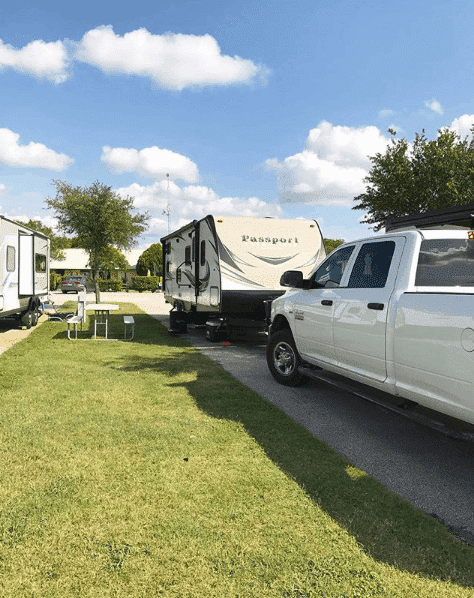
After countless hours of searching within a radius of probably 150 miles from my home, we found the right gas truck about 1.5 miles down the road:
- 2013 RAM 2500
- 5.7L HEMI
- Long bed (8′)
- Miles: 35,887
- Price: $26,999
I had searched around enough to know that I REALLY liked that price. That’s not cheap as far as vehicles in general go, but for a tow vehicle it felt like a steal.
Now, I decided to bring a wad of cash into this transaction, after selling the house, primarily because we had some negative equity built up in our 2013 Nissan Altima (with 98,000 miles on it) that we were trading in on the truck.
Here’s what that transaction looked like:
- Truck sale price: $26,999
- Trade-in allowance: $6,500
- Trade-in balance owed: $14,500
- Down payment: $9,647
- Extended service agreement: $2,175
- Financed amount: $30,119
- Monthly payment: $498
- Truck name: Benny
Oh, you came here for the selling part of the story? Well, I guess I should get to that part, but the buying side factors into the selling side so much that I felt you needed all of the details and reasoning possible.
My goal with this entire story, the financial details of our full-time experience, is to help you make the best decision possible for YOU.
The path we chose may be the opposite of what you need, but I hope that seeing our details helps you feel confident in whatever direction you choose with your full-time RVing experience.
Truthfully, I feel pretty uncomfortable laying all of this financial information out there. It doesn’t feel safe, because I know that some will consider us “foolish” for the financial decisions we made.
Some will choose to judge us and critique us. I’m not looking forward to that part, but it’s fine.
Because if I can help one person make a better decision for their family by sharing these details, then it will be worth it.
Selling (Trading In) the Truck

Believe it or not, this section should actually be much shorter than the buying section. It’s pretty straightforward but would not have been of any value to you without the details of how and why we bought what we did in the first place.
Once we made the decision to go back to the stationary lifestyle, it became clear pretty quickly that hanging onto the travel trailer and truck just didn’t make any financial sense.
While Julie and I talked early on about keeping the travel trailer and enjoying some nice weekend escapes, our 15-year old son was completely uninterested. Apparently, 17 months of RVing had given him his fill; all he wanted now was space and ALL the people.
Understanding that it would probably take a little while to get the travel trailer sold, we went ahead and listed it for sale as I was actively shopping for a fuel-efficient family vehicle to trade the truck in on.
Facing the Reality of the Miles We Drove
As you saw above, I bought the truck with 35,887 miles on it. When it was time to trade it in about 19 months later, it had 84,157 miles on it.
Yes, we had driven the truck 48,270 miles in that period. (Did I mention we moved around much faster than we should have?)
You can imagine that this impacted the truck’s value rather significantly:
- Amount owed on truck: $24,203
- Assessed trade-in value: $15,000
- My equity: -$9,203
Ouch! There’s no doubt about it, that stung quite a bit. But again, I had accepted this as a likely outcome at the beginning in the event that we left the RV lifestyle and had to get another vehicle. I tried to be a big boy about it and make the best decision possible, given our circumstances.
I don’t think I need to go into all of the details of our next vehicle, but I will say that we came out of pocket another $3,500 to get into another vehicle.
That was not a requirement of the financing we were offered; we chose that amount to keep our monthly payment at a manageable level. Again, not a perfect situation, but it didn’t completely rock our world financially either.
We moved into our next phase of life without regrets about the decision to purchase that truck.
I simply looked at this as part of the price we paid for the memories of a lifetime.
Selling the Travel Trailer
When you list your RV for sale online, expect to be contacted by an unfathomable number of entities claiming they can get your RV sold faster, and for more money, if you will just pay them $300-500.
I was tempted, but I resisted and I am glad I did. The online reputation of the vast majority of these companies is atrocious.
I do not believe they will actually be a help in the end to more than a tiny fraction of folks. So be careful and do your homework before you decide to believe what they want you to believe and hand over your cash.
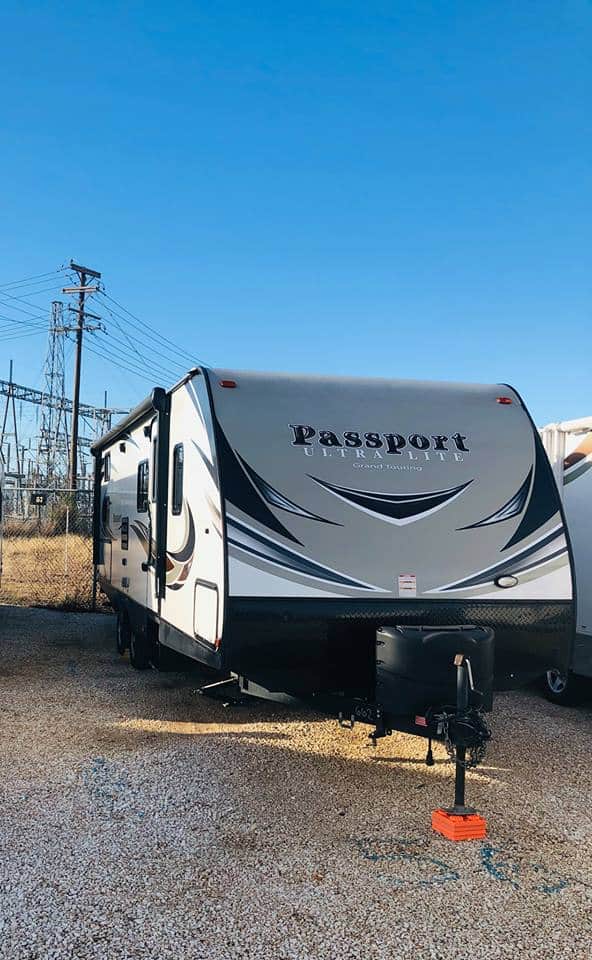
Around the same time that we traded in the truck in early December, we listed the travel trailer for sale on the following platforms:
- Facebook Marketplace (Free)
- RVTrader.com ($69 for 3 months)
You’ll never guess where my buyer ended up coming from. Yup, the free option.
I did receive interest from several parties through the RV Trader listing online (including one from California that was ready to make the drive), but we eventually sold to a family that lives about 25 minutes away from us.
January is the Busier Month for RV Sales
Even though we listed in December, it was pretty quiet until January. Then the number of contacts started picking up significantly. Keep that in mind if you try to sell your RV: It seems that buyer interest really begins to pick up in January, so plan your listing accordingly, especially if you are paying for a specific duration.
Details of Our RV Sale
I’ll have to apologize here, because I don’t have all of the specific numbers for the travel trailer sale available to me as I write this. I will have to use some estimates instead which should still accurately reflect the situation.
- Amount owed on travel trailer: Approx. $19,200
- Sale price: $17,500
- Sale price of extended warranty transferred to buyer: Approx. $1,300
- Total sale: $18,800
- My equity: -$400
So, we paid $6,000 up front to get into the travel trailer, we paid approximately $6,300 in monthly payments over 19 months, and we walked away $400 additional in the hole. And I was fairly relieved.
Look, I didn’t have any illusions going into this about the possibility of recouping the down payment or monthly payments on my travel trailer.
I assumed these were the costs of making this crazy thing happen. It was a cost we were willing to bear, and I was pleased not to be paying a huge additional sum out of pocket in order to transfer ownership.
Was Our RV Adventure Worth the Expense?
And with that sale, we officially ended our first venture into the world of RVing. That first venture cost us some money. We learned some valuable lessons.
And I wouldn’t give up a second of our experience for the chance to try and “do it better.” We did it, we loved it (struggles and all), and we are unspeakably grateful for the opportunity.
There’s a good chance we will step into Phase 2 of full-time RVing when our nest is empty in a few years.
What Did We Do Right?
As far as the RV lifestyle goes, I believe our actual purchase amounts for the travel trailer and truck were fairly moderate.
It’s not uncommon to see towable RVs selling in the $60K-$80K range. Even used, many of them would be more than what we paid for a new rig. And the trucks can easily reach into the $45K+ range.
We steered clear of those extremes, and I am very glad we did. I would not have been comfortable with higher up-front costs or monthly payments, even if it meant we might have a chance of recouping more on the back end.
Did we do this whole thing “smartly” from a financial perspective? No, I wouldn’t necessarily try and make that argument. (Refer to my opening remarks about the cost of spontaneity and speed in this process.)
But we reined in our desires for more space, and an increased level of comfort, in order to allow this grand adventure to happen at all. And we did it in a way that did not put us under extreme financial stress while on the road or ultimately wreck us financially.

Obviously, some of these expenses we incurred are offset by the fact that we didn’t have a mortgage to pay, we didn’t have car #2 and #3 to fuel and maintain, etc.
But even if those costs were not offset in the slightest, it would totally be worth it.
We’ve got one life to live. One chance to “seize the day” and “suck the marrow out of life”. Overall, I’d say we’re doing okay in that department.
So the question is: What life will you choose?
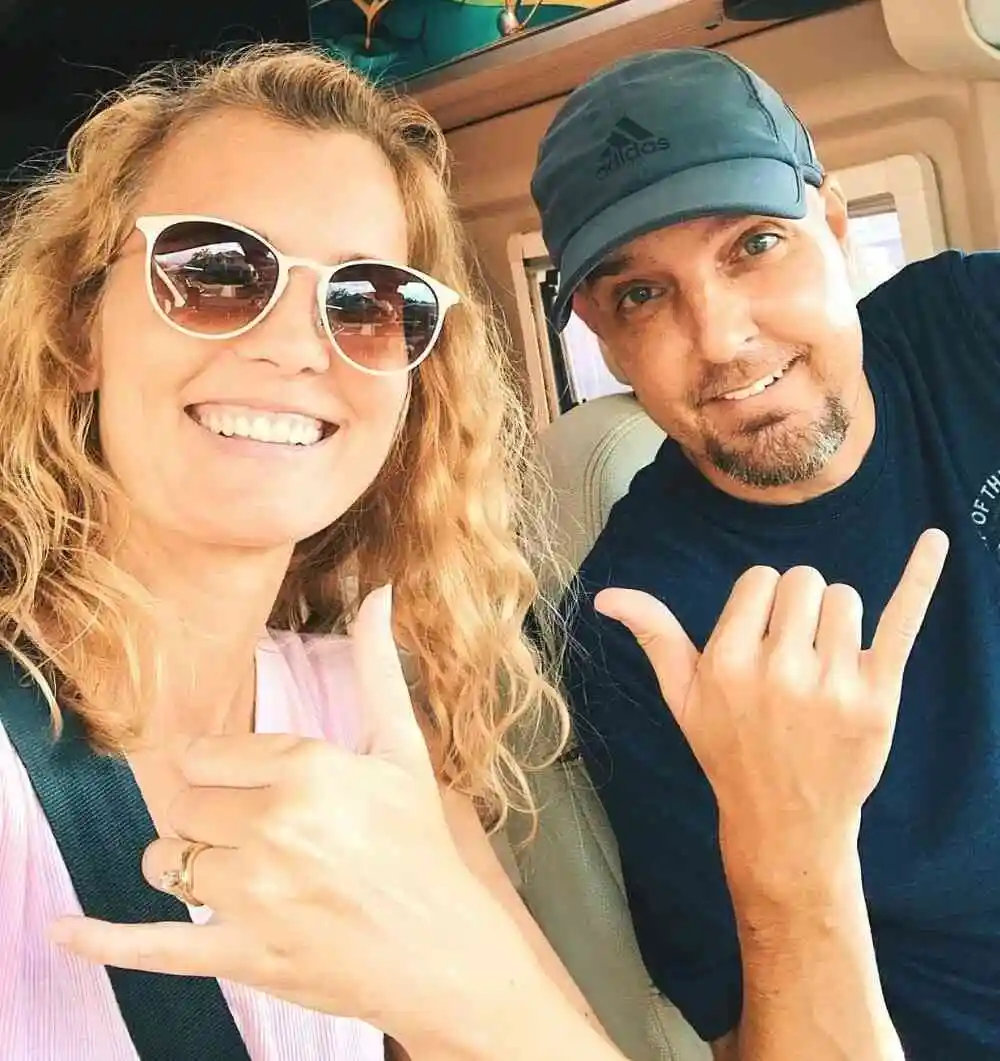
Todd loves a competitive game of table tennis, a breathtaking hike, and exploring new places. He lived and traveled in an RV with his family as they traveled throughout much of the US and parts of Canada. Todd has extensive knowledge about RV travel, safety, and accessories and has shared many of his stories here on TREKKN. When he’s not busy launching and building small businesses, you may find him staring at pictures of Glacier National Park (probably his favorite spot on earth).
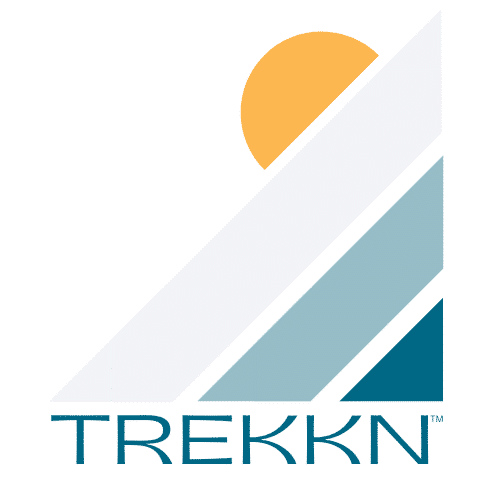


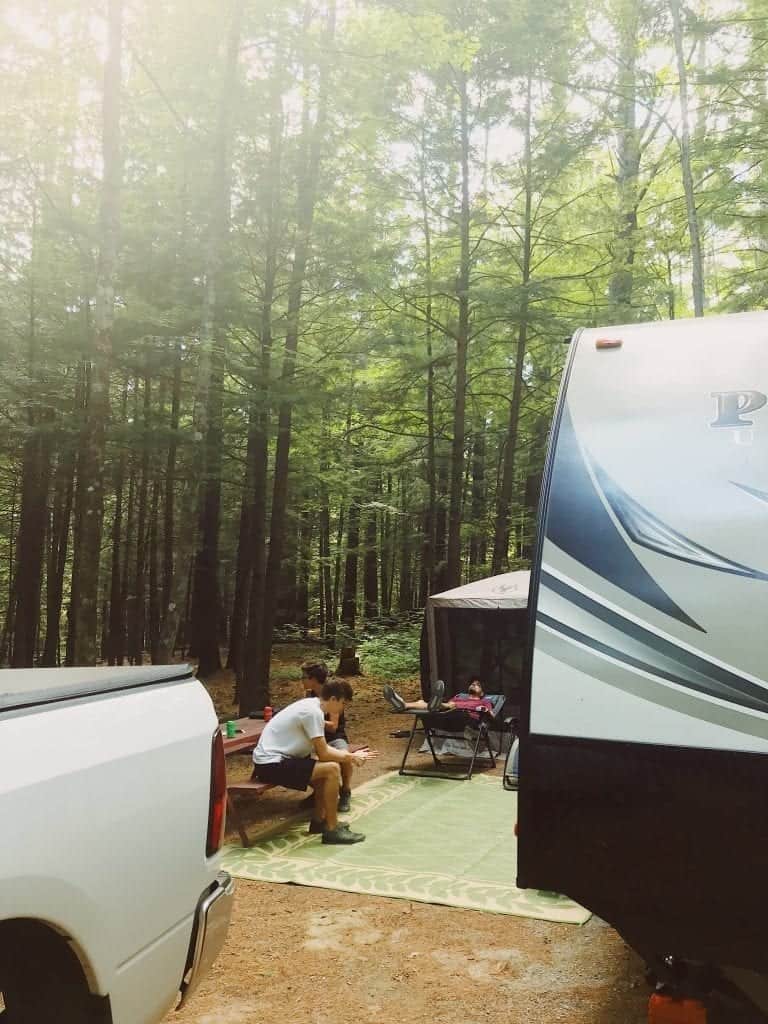
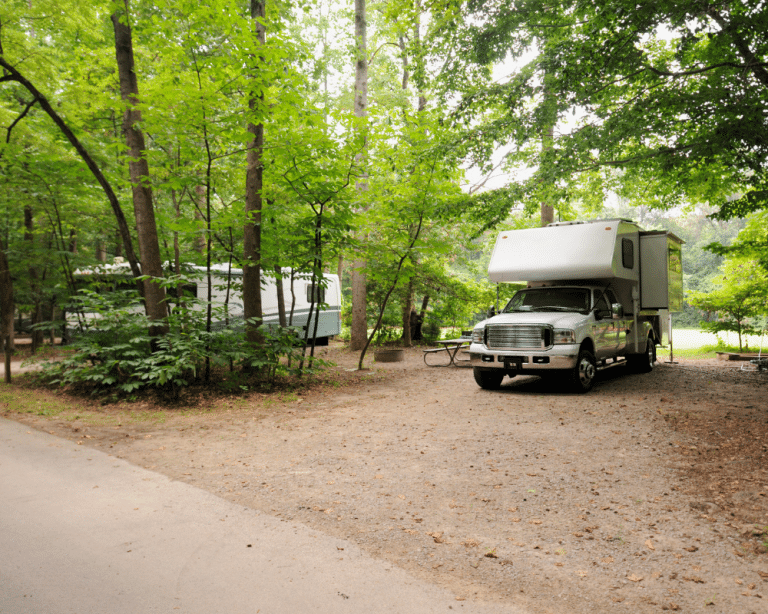
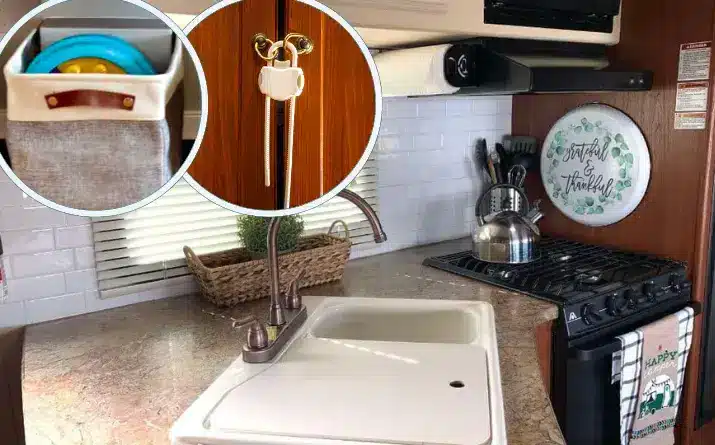
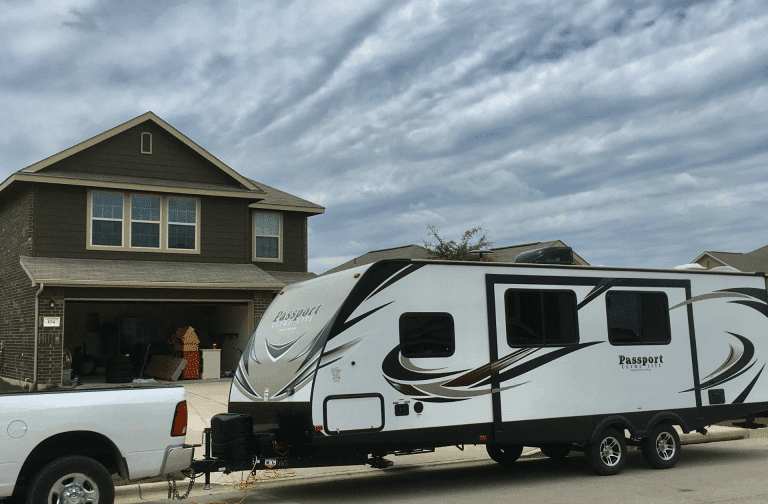
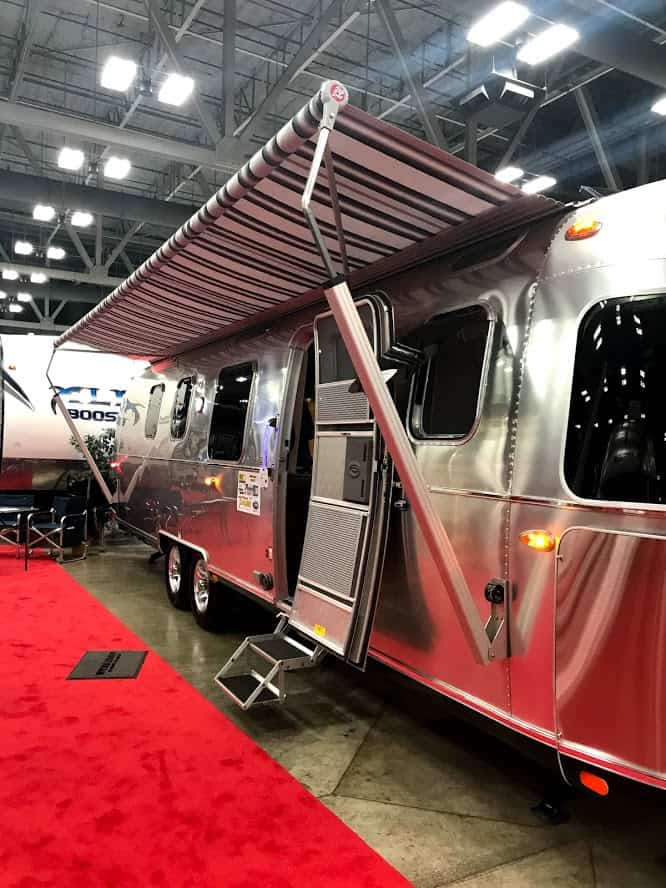
Hi Todd, thanks for the great post, I think it will help a lot of folks as they dive in to RV life. From the vantage point of being older, I can say that if you wait until everything makes perfect sense and is bullet proof financially, then you’ll never go. Plus the money you didn’t recoup was not wasted or lost, it was an incredibly smart investment in your family and in your own life experience. We haven’t full timed yet in the RV, but we travel 2-3 months a year at significant expense. These experiences will delay our retirement, but I don’t regret a second of any trip we’ve ever taken and it was worth every penny. No criticisms here, but just applause for taking the time to make the best financial decisions and research you could to enable you to do something DIFFERENT, incredibly rewarding, and once in a lifetime with your kids. Best of luck on your new adventures in Austin and beyond.
Hi Ed,
I can’t tell you how much I appreciate your comments and your encouragement. While I don’t regret any of our decisions, it is easy to look back on it with a critical eye and feel like I “should” have done it better. But like you said, if I had focused on perfection…it never would have happened! That’s so important for folks considering full-time RVing to remember as they go through this process. In a larger sense, as you touched on, it’s important to remember in every facet of life.
I’m so glad to hear that you are able to enjoy the RV life NOW instead of delaying it (indefinitely). We wish you many more miles of adventure and smiles! (And a speedy retirement as well.)
Have a great day, Ed, and I sincerely thank you for being a part of our community.
Todd
Hi Todd,
You did right. Congratulations to having the guts to live your life. How many people would spend that same amount of money on drink, drugs, whatever?
17 months of full time travelling – with all your family – and it only cost that much? Add up your hotel and meal costs if you tried that any other way.
I admire you guys. Life is about experiences and the memories those experiences give you.
Happy adventures in the future.
Hi Maurice,
I really appreciate your comments. And you’re right, there is absolutely no other way we could have had this type of experience together except RVing…without winning the lottery!
Happy adventures to you as well, Maurice. Peace.
Todd
I am all by myself which makes it scary. I have dreamed about this for so long that I am building up the courage to do this solo.
Hi Justin!
I don’t know how I overlooked replying to your comment, and I apologize. Although I have not done solo RVing, I am sure it is intimidating in many ways. When I try to picture myself there, some fears definitely rise to the top.
But think about this: Compared to trying to get a family of five out on the road full-time, your path should be relatively smooth and simple…all things considered. That’s definitely a bright side in my opinion!
And remember, the best things to counter your fear are: KNOWLEDGE and ACTION. You can find plenty of knowledge here and at many other locations around the interwebs, so no problem there. But the action? That ball is in your court, so just take a step forward. You won’t be able to see the whole path, you won’t have all the answers, you’ll still be scared. But it’s one tiny step at a time, nothing earth-shattering and nothing that can’t be reversed.
You got this, man. If you need any info or encouragement, you know where to find me. Just remember: Facing your fears is ALWAYS worth it.
Todd
I’ll tell you, I have spent years reading blogs, watching youtube etc (I’m bored until wife retires). We are not newbies and my wife retires in 2 years when we can finally go full time.
Your honesty and transparency is refreshing. Not everything is unicorns and rainbows in the RV world. Your blog entries are fantastic. Too bad your story was so brief. It was so real. Bravo.
Hi Ed,
First of all, thank you for your comment and your kind words. They are much appreciated.
But rest assured, our story is not over. That chapter of full-timing with kids was written and is behind us. It was amazing and grueling and fascinating and exhausting and unforgettable. And I wouldn’t give back a second of it.
Our next chapter (following these two years back in bricks-n-sticks where we started from) starts in less than two weeks when we leave Texas and head for Hawai’i for a year (or more?) of exploration and amazement. No, it won’t be in an RV…but that next RV chapter could be the one following this. We don’t have it all scripted out; we rarely do. But we know that we just can’t imagine ourselves not moving back into full-time RV mode in the near future. Only time will tell!
In fact, it’s possible that we could be hitting the road again just as you are doing the same in a couple of years! If so, we’ll look you up. 🙂
Peace to you both, best wishes on your full-time plans, and thanks for your encouragement. I hope you’ll stick around for “the rest of the story” (to quote a radio personality from my childhood).